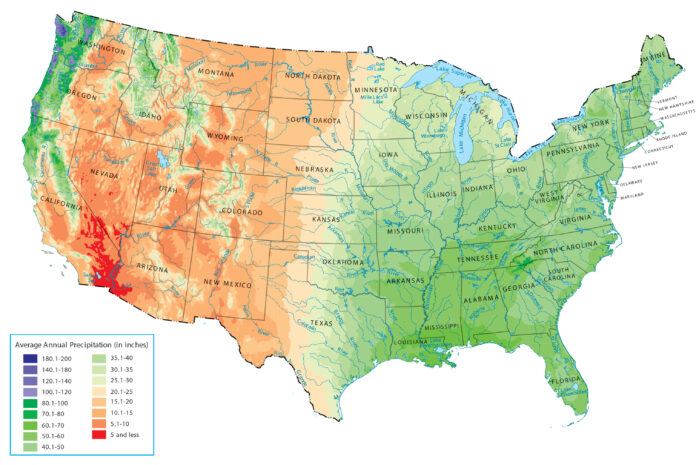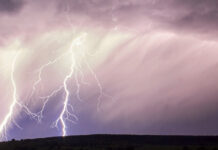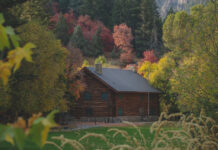I am lucky to be living in an area unaffected by what the media is calling “The Megadrought.” We received about four tenths of an inch of rain yesterday. (That’s more rain in two days than France received all last month.) We expect more today.
Much of the Western United States, the UK, and Western Europe is in the middle of a drought. Record-breaking temperatures hit large parts of the northern hemisphere this summer. The combination is stressing electrical generating capabilities and food supplies. Whether or not you blame climate change, it’s clear that the Western U.S. is consuming more water than Mother Nature can re-supply.
The drought in the Western United States isn’t a surprise. It’s been growing worse for a few years as reservoir levels shrink. Scientists have predicted the over-use of water from the Colorado River has since the 1920s, but politicians just kicked the can down the road. Unfortunately, the can appears to have reached the end of the road.
Unlike the U.S. western drought, the drought in Europe is a surprise. The Rhine River is so low as a result that it is likely to be closed to barge traffic. This will interfere with the delivery of coal to power plants, fuel, food and other goods. The same thing would happen here if the Mississippi suddenly ran dry.
Move Somewhere it Rains
If you live in California and the surrounding states that are in a drought and/or draw water from the Colorado River, I would recommend you consider moving unless you live in a very remote area and have your own water source and senior water rights. (Of course, if you live in California, there are many reasons to move. Water scarcity is just one of them. I am always surprised at the number of preppers who still live in California, with its politics, forest fires, earthquakes, and droughts.)
I recognize my recommendation to move may sound over-the-top, but here’s the comparison I want to make: You would probably move if a credible authority told you that the city in which you live did not have sufficient oxygen available and they would have to start rationing breathable air within two years. Well, you need water to survive almost as much as you need oxygen. Move while you can still find a bigger sucker willing to buy your house. Move before the next dust bowl becomes a reality. At some point, the taps will run dry. Don’t wait too long.
I recommend moving to somewhere with at least 35 inches of rain per year. My state is well above that and where I live in the Appalachians, we get even more. It keeps things verdant. So much rain is also ideal for survival, although there are days you may need some rain gear. (I recommend USGI Ponchos.) It isn’t Los Angeles where it’s warm and sunny most of the time, but that’s kind of the point.
The East Gets the Rain
If you look at the above map (provided by GISGeography), you will note that apart from the coastal rain forests out west and some mountainous regions, the Eastern U.S. is blessed with far more rainfall than the Midwest and West. The South and Southeast have even more rain. Of course, more rain also means more humidity, which can be uncomfortable during hot weather and contribute to mold.
In the west, man-made dams, reservoirs, irrigation systems, wells, and pumps have all helped provide water to needy people and farms. When you fly across the country, you reach a point where the fields are circular, and you know you are entering a more arid area where irrigation is required.
What happens when irrigation is no longer available? This could occur because of drought, drawing too heavily on underground aquifers, or a systems collapse that results in no electricity to run the pumps. I’ll tell you what happens: food production falls off a cliff and life becomes a struggle. Farmers in California use more water than the cities. The rest of the country depends on farms throughout the dryer parts of the country to provide food.
That point of collapse may have happened already in some locales. There are news stories about farmers who cannot accord to run their well pumps because of high electricity prices in Texas.
The Long View
If you take the longview towards preparedness and survival, you’ll study that map and head for the green areas, if you aren’t there already. You’ll look for property with a stream or river running through it. When the SHTF, we’re going to have enough problems finding food and fending off the hordes. You are going to want water to be something you don’t have to struggle for. Not only do you need a steady source of water, so do your livestock and crops. Gardening is far easier when there is plenty of rain falling from the sky. I watered my garden only five or six days this summer, and on two of them it rained that evening, meaning I could have held off.
I know Joel Skoussen considers many variables in his book Strategic Relocation. You should come up with your own list ranking your needs and desires. I recommend water availability rank near the top.
Lakes Don’t Guarantee Water
As the people in Las Vegas are realizing, the presence of a nearby lake does not mean you will never run out of water. This is especially the case with man-made reservoirs.
I remember a trip a decade or more ago when I drove through South Carolina and into Georgia on I-85 during a major drought. We passed multiple lakes where there were expensive houses along the shore. Most houses had a dock that didn’t come anywhere near the water’s edge. A hundred feet or more from the end of the dock was what little water was left in the lake. A drought had dramatically reduced the water level, often dropping it tens of feet.
That fall, a hurricane or two brought heavy rains to the area. The drought ended, and the lakes filled back up surprisingly fast. Regardless, it would have been a rough year for anyone depending on the lake for their source of water and food. Lakes rely on rain, too, and can shrink in a drought.
Melting Snow
For parts of the West, water comes from the melting of the snow pack, which usually builds up each winter. Unless a drought reduces the snowfall, of course, as has been the case lately.
This is something to keep in mind as you look at property. You might visit a property in the spring and be delighted at the stream running through it. If it relies on snow melt, you may have a seasonal stream. By August or October, that stream could be dry. That could put you in a pickle, prepper. (Pardon the pun).
Also, if your long-term survival plan is to melt snow in the winter, think again. A big tub of snow melts down into far less water. It is more productive to melt ice. Better yet, have a source of surface water and filter it.
Water Equals Life
Water is critical to life. We all need to survive. Why live somewhere your future supply of water is in doubt, out of your control, or both?
Yes, I know we are in the middle of what may be an economic collapse, but if you have a steady income and some money in the bank, you may be able to take advantage of the recession and depressed real estate values to find your perfect prepper property.








